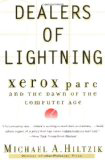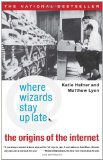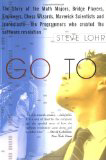Computer History Books
Tue, Feb 21, 2012After my Christmas visit to the Computer History Museum I picked up a handful of computer history books and wanted to recommend a few of them to any programmers out there interested in how their tools and technologies came about.
Dealers of Lightning

Xerox Parc and the Dawn of the Computer Age
…a fascinating journey of intellectual creation. In the 1970s and ’80s, Xerox corporation brought together a brain-trust of engineering geniuses, a group of computer eccentrics dubbed PARC. This brilliant group created several monumental innovations that triggered a technological revolution, including the first personal computer, the laser printer, and the graphical user interface, only to see these breakthroughs rejected by the corporation. Yet, instead of giving up, these determined inventors turned their ideas into empires that radically altered contemporary life and changed the world
This is one of my favorite computer history books. The Alto was an unbelievably ground-breaking personal computer, and its story, along with other creations at Xerox PARC is full of interesting characters and fascinating stories such as when Gary Starkweather and Ron Rider were inventing the laser printer. Rider was working on the Research Character Generator (RCG) that scanned a computer image line by line in order to generate the position of all the dots the printer needed to print out - when a corporate reshuffle relocated him to another building over a kilometer away with no hard line of communication. Thus leaving the RCG generating data in one building for a laser printer waiting for that data almost a mile away.
“Don’t worry, you’ll be back together again in another year”
So the pair quietly purchased some telescopes, low power lasers and some photodetectors and set them up on the roof to use the fricken laser to make their own visible light data link between the two buildings!
“I’d send a pulse of light up the hill to signal the RCG to send a line of data down to the detector on my roof, which would send it down to the laser and then to the printer”
That’s awesome! … well, mostly:
“One morning after a foggy night we were summoned to field a complaint from a Palo Alto police officer. A local motorist startled by a ghostly red beam crossing overhead had run herself off the highway and into a ditch the night before”
Oops!
Where Wizards Stay Up Late
The Origins of the Internet

In the 1960s, when computers were regarded as mere giant calculators, J.C.R. Licklider at MIT saw them as the ultimate communications devices. With Defense Department funds, a band of visionary computer whizzes he inspired began work on a nationwide, interlocking network of computers. Where Wizards Stay Up Late captures the hard work, genius, and happy accidents of their daring, stunningly successful venture.
While ‘Dealers of Lightning’ documented the dawn of the personal computer, this book tackles the creation and early years of the internet. From the creation of the defence departments ARPA group and its early work with contractors Bolt Beranek and Newman (BBN) building the first Interface Message Processors - IMPs (the interface between host computers and the network), almost accidentally discovering the networks killer app - email - and taking us up to the explosion of hosts on the public internet in the 1990s and beyond.
‘Where wizards stay up late’ is the definitive work on the early years of the internet which we now take for granted and could hardly live without.
GO TO
The Programmers who Created the Software Revolution

… tells the remarkable story of computer software and its creators, from the early days of complex mathematical codes mastered by a few thousand to today’s era of user-friendly software and over six million professional programmers worldwide. Steve Lohr maps out programming’s unique seductions and gives us an intimate portrait of the peculiar kind of genius drawn to this blend of art, science, and engineering.
With the previous books covering the personal computer and the internet there was, naturally, a heavy leaning towards the hardware side of the story, but this book is all about the software - and thats my kind of book!
It can’t possibly discuss every language variant but does a good job of covering the basics (pardon the pun) including Fortran, Cobol, Unix/C, Basic, Algol, Pascal, C++, GUI, Java and modern Open Source programming. It’s not a technical book, and that’s a good thing. Instead it talks about the educational and commercial environments of the times and the reasons that lead to the various generations of languages, and introduces the people behind each successive step in the evolution.
Since it was published in 2001, it ends with Java “The messy birth of a new language” - I would love to see a new edition of this book every ten years or so covering the further evolution of programming into the modern web, mobile and parallel multi-core programming generation.
Insanely Great
The Life and Times of Macintosh, the Computer that Changed Everything.

The creation of the Mac in 1984 catapulted America into the digital millennium, captured a fanatic cult audience, and transformed the computer industry into an unprecedented mix of technics, economics, and show business
I have to be honest, I’ve never really been an Apple fan. I grew up (in Europe) on the C64, the Amiga and then Unix and Windows and was never particularly impressed with the classic Mac. Yes, it had some innovations (and some stolen ideas), but it was way too expensive - and as far as I remember - a failure in the marketplace. While the next gen iMac was the opposite - a success in the marketplace with absolutely no innovations (really, it was a lousy computer with a fancy blue case).
For me, Apple didn’t become a great company until the iPod, iPhone, iPad mobile revolution, and now there is absolutely no denying that it is a fantastic company that produces amazing products and dominates its market.
So when talking about the original Mac, phrases like “The computer that changed everything” and “The most important computer ever made” come across as a somewhat fanboy-ish exageration, very apple-centric, and also very USA-centric (you know we did have computers in the rest of the world), but this book is still a great read. Whether a great computer or not, the history behind Apple and the original Mac is fascinating…
… although I have to say, combine this with his recent autobiography and it really just reaffirms my impression of Steve Jobs as an asshole, maybe a genius, but still an asshole :-)
Turing and the Universal Machine

Alan Turing, instrumental in breaking the Nazi Enigma code, is also regarded as the father of the modern computer. In this book, Jon Agar tells the fascinating history of the appearance of the universal machine: from the work of Charles Babbage in the 1820s and 30s, and the data-sorting nightmare of the 1890 American Census, to Turing’s formlation of a ‘computing machine’ designed to solve an infamous mathematical problem of his day.
This last book is a short and sweet history of the idea of a Universal Computing Machine, with plenty of introduction of the Babbage difference engine, the analytical engine, tabulating punch card machines and the need for computing during the two world wars. It’s not until the second half of the book that it goes into depth on Turing and his ideas for a universal computer.
Unfortunately, Turing did not live long to benefit from his successes. He was prosecuted for homosexuality and kicked out of the secret service during the height of the cold war. With a British government paranoid about the possibility of him being blackmailed and leaking secrets to the Russians, he died - allegedly committing suicide - with a poisoned apple !?
And the British Government are still refusing a posthumous pardon - Sad.
Links
- Dealers of Lightning - Michael A. Hiltzik.
- Where wizards stay up late - Katie Hafner, Matthew Lyon.
- Go To - The programmers who created the software revolution - Steve Lohr.
- Insanely Great - Steven Levy.
- Turing and the Universal Machine - Jon Agar.
